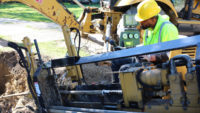Newark, N.J.’s efforts to get the lead out of its drinking water received a $120-million boost in late August, accelerating the replacement of approximately 18,000 suspect service lines connecting residences and businesses with the city’s water system.
The low-interest loan, backed by the Essex County Improvement District, will enable Newark to complete in as little as 30 months a process originally expected to take up to 10 years, city officials say. Relying solely on state funding, Newark began swapping out lead-containing pipes with copper lines in March at an estimated cost of between $5,000 and $10,000 each. Just over 800 lead pipes had been replaced by the end of August, according to the city. Along with relying on federal assistance, which had been slow in coming, the loan also frees property owners from having to pay a share of the replacement cost.
City spokesperson Frank Baraff says the replacement work will be performed by private contractors, though details of the bidding and project delivery process are unknown.
“The city is anxious to get this underway as fast as humanly possible and will chose the fastest possible process to choose contractors and get them on the job,” Baraff says.
Newark’s water system provides approximately 80 million gallons per day to more than 300,000 customers within the city and surrounding communities. After elevated lead levels were discovered in drinking water samples in early 2017, a systemwide assessment found no problems at the city’s two treatment plants or their raw water sources. Last year, Newark began using zinc orthophosphate as a corrosion inhibitor in its distribution system, and distributed nearly 40,000 water filters to homeowners.
Those measures proved less than fully effective. Tests at two filter-equipped homes this past August revealed lead levels of 55 parts per billion—more than three times the federal action level, resulting in an emergency bottled water distribution program while tests are carried out at an additional 225 homes. Over Labor Day weekend, residents at a 37-story luxury high-rise in downtown Newark were advised against consuming the building’s tap water.



